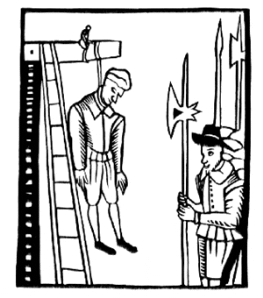It was some eighty-five years after the last person to be burned for heresy that Thomas Aikenhead, a medical student at the University of Edinburgh was tried, convicted, denied appeal, and hung for the crime of blasphemy. He died on this day in 1697.
In the brief biographical account at the Dictionary of Unitarian & Universalist Biography, Andrew Hill describes Aikenhead and the events.
“Thomas was the son of James Aikenhead, an Edinburgh surgeon-apothecary, and Helen Ramsey. Nothing is known of his upbringing, except that by age 10 he was an orphan. At age 17, in 1693, he matriculated at Edinburgh University. By then the University library held books by Descartes, Spinoza, Thomas Hobbes and other so-called atheists. While Thomas was a student, Toland’s Christianity Not Mysterious was added to the collection, as was Michael Servetus’ Christianisimi Restitutio. In 1696 the Scottish Privy Council ordered a search for books deemed “atheistical, erroneous or profane or vicious” in the stock of Edinburgh booksellers.
“Aikenhead had talked about his reading with friends. After John Frazer was imprisoned and sacklothed for reading deist literature, one of them, possibly Mungo Craig, informed on him. In the autumn of 1696 Thomas was arrested and remitted to the Tolbooth Prison “to be tryed for his life” for blasphemy. He mouldered there until December 23, when he crossed Parliament Square to the High Court to be charged under both of Scotland’s Blasphemy Acts, one enacted before and one after the Revolution of 1689.
“The 1661 Act ordained death for anyone “not being distracted in his wits” who shall “rail upon or curse or deny God, and obstinately continue therein.” The 1695 Act confirmed the earlier act but graduated its penalties: first offence, imprisonment and sackcloth; second offence, imprisonment, sackcloth, and a fine; third offence, death.”
The indictment recorded in part in Wikipedia, declared the twenty-year old Aikenhead “had repeatedly maintained, in conversation, that theology was a rhapsody of ill-invented nonsense, patched up partly of the moral doctrines of philosophers, and partly of poetical fictions and extravagant chimeras: That he ridiculed the holy scriptures, calling the Old Testament Ezra’s fables, in profane allusion to Esop’s Fables; That he railed on Christ, saying, he had learned magick in Egypt, which enabled him to perform those pranks which were called miracles: That he called the New Testament the history of the imposter Christ; That he said Moses was the better artist and the better politician; and he preferred Muhammad to Christ: That the Holy Scriptures were stuffed with such madness, nonsense, and contradictions, that he admired the stupidity of the world in being so long deluded by them: That he rejected the mystery of the Trinity as unworthy of refutation; and scoffed at the incarnation of Christ.”
He was convicted on Christmas Eve, 1696. He appealed based on his youth and the fact this was his first offense, which according to the letter of the law should have freed him. The Privy Council replied that only the church could intercede on his behalf. The General Assembly of the Church of Scotland met, declared their fear of the “abounding… impiety and profanity in this land,” and called for a “vigorous execution.” I get what the word execution means, but I’m unclear in this context about the vigorous. Whatever the niceties, a consequence of this is that the professional upholder’s of Ezra’s fables have an equal share of the blood on their heads.
It was in the morning of this day in 1697, he wrote a letter to his friends describing how we humans have “an insatiable inclination to the truth, and to seek for it as for hid treasure…”, not long after which a bible was thrust in the young man’s hands, and surrounded by the clergy praying their prayers, he was walked to the gallows.
Me, I think the day calls at some point for each of us to lift a glass in Thomas Aikenhead’s memory and remember what the cost for that insatiable inclination to the truth can be.
Cursing your favorite religion is optional.
Amen.













